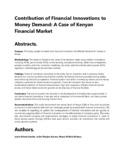| dc.description.abstract | Purpose: This study sought to assess how financial innovation has affected demand for money in Kenya.
Methodology: The research looked at the value of transactions made using modern innovations including ATMs, point-of-sale (POS), online banking, and phone banking. Under the cointegration, granger causality, and error correction modeling, the study used the ordinary least squares (OLS) regression methodology as the estimate method.
Findings: Financial innovation, according to the study, has an important role in growing money demand in a country by enhancing financial visibility, facilitating financial processes during trades, and enhancing financial competence. Financial system innovation in emerging nations such as Kenya indicates a potential for financial sector expansion. Financial innovation has shown to be a fundamental predictor of financial advancement, high-tech expansion, efficient financial market access, and hence better economic growth via the diversity of financial facilities.
Conclusion: Financial innovation has resulted in the development of employment opportunities in non-bank financial institutions. It has also led to integration of commercial bank, non-bank private lenders, insurance firms, and housing finance firms.
Recommendations: This study recommend the central bank of Kenya (CBK) to fine-tune its policies to ensure it is well suited to deal with the challenges posed by sophisticated financial innovations. CBK can increase its capability to predict the consequences of financial innovations and act quickly to counter any negative effect of financial innovation on the effectiveness of monetary policy. The study also recommend company and organizations managers to adopt financial innovations in order to boost service quality through efficient and quick service provision via innovations like mobile and online payment systems. | en_US |

